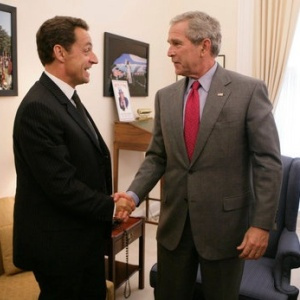France’s Road Map of Foreign Policy
By Seyyed Mohammad Tabatabei, Iran’s cultural attaché in Paris

Since Nicholas Sarkozy has become president, France’s foreign policy has undergone substantial changes, not only in tactics, but also in strategies and diplomacy.
Though Sarkozy has rose from a center-right party (UMP), he has totally distanced himself from the course followed by other successors to Charles de Gaulle like Chirac and Dominique de Villepin. His party won parliamentary majority after he entered Elysee Palace, electing a right-wing prime minister for him. With a cabinet in full-agree with him, Sarkozy shouldn’t have any problem advancing his agenda.
Sarkozy became the French president when two years had remained from Bush’s second presidential term. Starting his foreign visits from U.S., Sarkozy tried to align his country with U.S. policies. Moreover, he tried to make the public believe he can continue Bush’s policies after the American president has left his post. In line with this, France sent troops to Afghanistan and added to its presence in other regions to adopt an active policy in accord with that of George Bush.
In terms of foreign policy, Sarkozy tends to adjust France with Bush’s –not U.S. - peculiar policies. We can’t say the strategies Bush has adopted are exactly U.S. conventional policies. Sarkozy intends to highlight Bush’s concerns and follow his goals in the post-Bush days.
Sarkozy’s first year of presidency was replete with failure, both in domestic and foreign policy. No French president has experienced a similar popularity nosedive among citizens. French are highly discontent with their president and believe he has deceived them. Purchasing power, inflation, unemployment and most important of all, Sarkozy’s self-assumed position are some problems of the French president.
Some citizens believe Sarkozy is the French Zorro in the domestic stage since in unimportant problems he’s always there, while in important issues that demand crucial decisions he is absent.
As mentioned above, in foreign policy Sarkozy hasn’t followed France’s traditional course. Since de Gaulle’s presidency France always followed an independent policy which in one instance even led to its withdrawal from NATO’s military committee. Currently, one of Sarkozy’s goals is to turn France into an active NATO member. Though France became NATO’s full member during Chirac’s presidency, Chirac was not in fact inclined to this membership; consequently Paris wasn’t an active of this organization. The point is highly controversial in France’s political stage since NATO membership means falling under U.S. defense umbrella and this is intolerable for free-thinking French.
On Middle East, moving against France’s former policies –that tried to keep balance in its relations with Arabs and Israel-, Sarkozy apparently sided with Israel, probably a result of his Jewish roots.
Sarkozy’s foreign policy and the European Union
Sarkozy’s European initiative was the idea of establishing the Union for Mediterranean which was heavily criticized in the European Union, probably most strongly by Germany. The main objective of this union was to create an opportunity for Israel -that isn’t incorporated in many regional organizations- to play a more active role in the international stage. Another goal was to keep Turkey away from EU membership. Sarkozy strongly opposes Turkey’s joining the European Union while EU itself has guided Turkey inside a tunnel with no clear light at the end.
France and the United States
Bush’s foreign policies have not taken the form of a doctrine yet. Though neo-cons propose ideas for world management, U.S. president’s policies will become a doctrine when succeeding presidents follow his way. Sarkozy wants to doctrinize ideas proposed by George Bush. However, the foreign policy of this western European country has become more conservative recently, reverting to its conventional course and it seems that Sarkozy’s radicalisms have lost strength.
France has just become president of the European Union and it is predicted that its term is going to be full of challenge, regarding both Bush’s doctrine and EU concerns. Some observers say that during its 6-month presidency, France will try for signing of the Treaty of Lisbon by European parliaments.
France and the Persian Gulf
Traditionally, France has never been an influential power in the Persian Gulf. Arab states of this region didn’t count on France, especially in security affairs. United States and Britain are two countries who play the major role in this region. However, after rising to presidency, Sarkozy signed a treaty with UAE to establish is military base in its territory. This is a sign that France aims to shift its traditional policy in the region, though it is unlikely that it becomes influential in affairs rather than those which have an economic nature.

